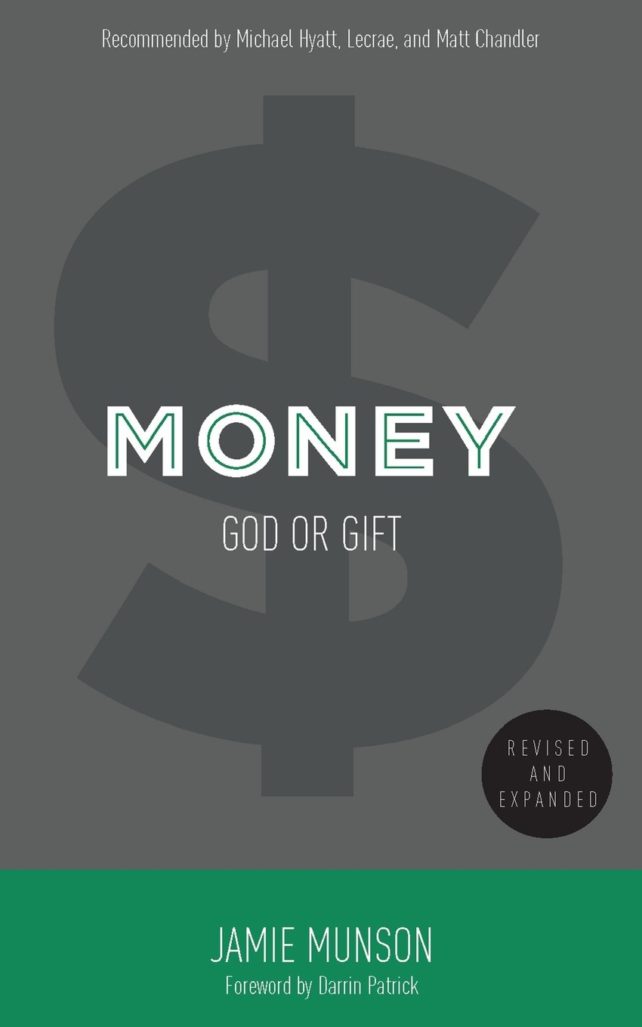Money: God or Gift is the personal finance book recommended by Michael Hyatt, Lecrae, Matt Chandler, and more.
Money. Cash. Coin. Bling. Scrilla. Cheddar. Dough.
Whatever you call it, the god of gold promises security, peace of mind, comfort, status, freedom, and all of our wildest dreams come true. From the Bible to the Beatles, however, our culture is filled with reminders that money can’t buy what actually matters in life.
And yet money still keeps us up at night. People worry about it, live for it, die for it, and even kill for it. Money: God or Gift presents a better way:
- Get money without getting greedy
- Spend money without shame
- Save money without stressing
- Give money without guilt
- Enjoy money as a gift without worshiping it as a god
You’ll learn all of this and more as Jamie Munson discusses faith, stewardship, personal finance, and other money matters. Love it or hate it, we can’t afford to ignore it. Master your money or it will master you.
Put money in its proper place, and be free.
- Quote: “No one can serve two masters, for either he will hate the one and love the other, or he will be devoted to the one and despise the other. You cannot serve God and money.” — Jesus (7)
- Note: The chapter talks about how money is not evil and it is not the root of all evil. The love of money is the root of evil.
- Note: You cannot serve both God and money, especially when you love money. If you love money there is no room in you to also love God, because you will not be able to balance both your relationship with him and with money.
-
Quote: “But who am I, and what is my people, that we should be able thus to offer willingly? For all things come from you, and of your own have we given you.” — King David (13)
-
Note: We need to be good stewards of our money, because it was God who gave it to us and ultimately it is all his. So, we need to care for it as if it were not our own.
-
Note: Money still matters, we need it to function in our lives, but we just cannot go around thinking it’s all ours when it is God’s.
-
Quote: “The years of our life are seventy, or even by reason of strength eighty; yet their span is but toil and trouble; they are soon gone, and we fly away. … So teach us to number our days that we may get a heart of wisdom.” — Moses (21)
-
Note: It is important to have a budget and a plan on what to do with the money that comes in for each paycheck. Living paycheck to paycheck is not good, and neither is just spending money on whatever you want just because you have money.
-
Note: It is also not okay to rely on your parents to just give you money whenever you run out. And above all else, it is never okay to just run things up on your credit card and just get new ones when those hit their limits.
-
Quote: “Money is the answer for everything.” — King Solomon (29)
-
Note: It’s okay to go out and make money; the author even encouraged his own daughters to go out and raise money for something that they wanted.
-
Note: Working toward or for something is good and healthy; we just need to make sure that it doesn’t take over our lives.
-
Quote: “Take care, and be on guard against all covetousness.” — Jesus (41)
-
Note: It is okay to spend money on the things you need, but we need to watch out for the things telling us to spend, spend, spend!
-
Note: We need to make sure that we are not getting into debt with our credit cards because “the borrower is the slave of the lender;” we owe everything we spend. There is no such thing as free money.
-
Quote: “All of our saving, preparation, and plans amount to nothing if these contingencies replace God as the bedrock of our life and hope.” (56)
-
Quote: “Save as an act of prudence and stewardship, not as an act of anxiety and fear of what the future may hold.” (57)
-
Note: Our objective in saving should not be to increase our wealth, but to honor God and bless others with what we have been given.
-
Note: We are not required to save but God asks that we trust him with everything that we have so that he will provide for our needs.
-
Quote: “Invest in what has lasting value. … Whatever treasure we store up on earth will be left behind when we leave. Whatever treasures we store up in heaven will be waiting for us when we arrive.” (62)
- Note: At the end of this life, everything we have invested will be left behind. We should use what we do have and store it up in heaven to honor God with the time we are given.
-
Quote: “Money follows heart. Heart follows money. The more you invest — money, time, energy — in Jesus’ mission on earth, the more you’ll look forward to seeing everything come to fruition when Jesus returns.” (66)
-
Note: When we give with our hearts, it does not matter the amount we have to give or what another person has given. The generosity behind it is what matters. God sees where your heart is when you give.
-
Quote: “Every opportunity to give becomes an opportunity to demonstrate that our truest, most valuable possession is Jesus and the hope we have in him. ‘If stewardship is a sign of a redeemed life, then Christians will, by their natures, want to give.’” (73)
-
Quote: “God does not need our giving. Our giving serves as a test of whether we need him. Giving to the glory of God reveals our true allegiance, along with his lavish love, generous grace, humble power, and faithful promises for the world.” (76)
-
Note: This chapter shares about the many reasons we should give: We are made in the image of God, giving is an act of praise, giving demonstrates the value of Jesus, give to be blessed and, finally, to serve and care for others and Jesus.
-
Note: There are three characteristics of a generous attitude: Cheerful giving, sacrificial giving, and regular giving.
-
Quote: “We want to do our best to multiply the resources he has given us in order to make highest and best use of God’s gifts. The legacy you leave summarizes your faithfulness and stewardship of everything God has entrusted to you for his glory and the good of others.” (98)
-
Quote: “Start loving your future spouse now by practicing good stewardship.” (102)
-
Note: We can dream big and plan big, but we still need to let God be God. When we plan to increase our resources we should be willing to accept that our plans may change as God is shaping us in our lives.
-
Note: This chapter has good practical tips on how to better manage our money by showing separate categories in advice for parents with children, advice for people who are single, advice for married couples, and advice for middle age and older.
-
Quote: “The world is broken and life rarely fits together like a nice puzzle. Don’t spend a ton of energy trying to create heaven on earth. Creation is subject to frustration, and you will get very, very frustrated if you try to make things perfect.” (113)
-
Quote: “Our worries reveal our slavery to sin. Our inability to cease worrying reveals our helplessness. Our helplessness reveals our need for God’s grace. God’s grace sets us free from worry and enables us to change through repentance.” (115)
-
Note: Don’t worry about money as much as possible. You can make stewardship plans to serve your most common concerns, for instance, keeping a savings account with enough money in case of unemployment.
-
Note: God will meet your needs and will provide whatever you need according to his will. Take it one day at a time.

